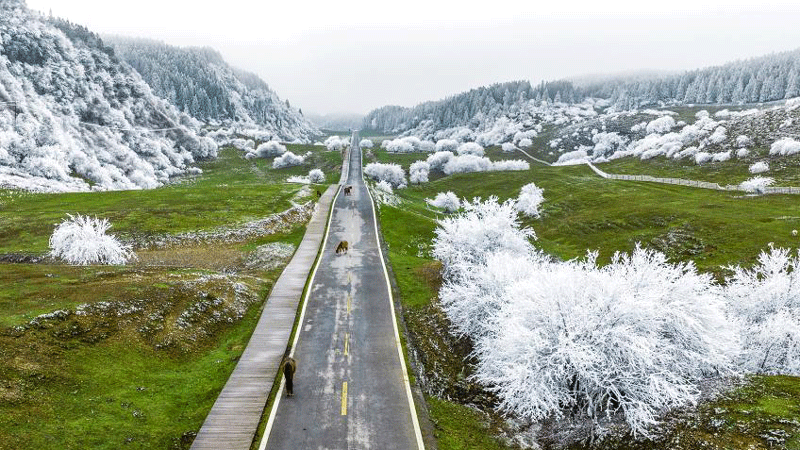Commodity fair witnesses consumption upgrade in Tibet

This photo taken on Oct. 29, 2022 shows the autumn view of Potala Palace in Lhasa, southwest China's Tibet Autonomous Region. (Xinhua/Chogo)
LHASA, Dec. 6 (Xinhua) -- At an ongoing local commodity fair held in Shannan City, southwest China's Tibet Autonomous Region, Losang is surrounded by visitors interested in the tea, mushrooms, and other specialty food displayed at his booth.
The products come from Legpo, a remote area nestled in a valley in the eastern Himalayas. With a temperate climate all year round, agricultural products there are of excellent quality.
Sales have been climbing since Losang's company was established five years ago, and its products have gained popularity in Lhasa, Shannan and other places in the region.
With the significant improvement in living standards, farmers and herdsmen in Tibet are no longer satisfied with merely filling their stomachs. Instead, they are pursuing a high quality of life, such as paying more attention to the nutrition of their daily meals, leading to the formation of new consumption habits, said Losang, head of the company.
Previously, specialty products from remote areas of Tibet were generally little known to non-locals, but now their rich ecological value has been recognized by a wider range of consumers, partly thanks to better transportation.
Meanwhile, brand consciousness is growing in the plateau region. The trend has prompted companies to put more emphasis on quality control to build their brand image.
At the fair, Pasang, a native of Shannan, bought 5 kg of pork at the booth of a locally renowned agri-tech company. "My family loves this brand. Though their product costs more than ordinary pork on the market, it is worth the price," he said.
Jampa, chairman of the company, said that in order to ensure the quality of their pork, the company feeds the pigs mainly wheat, corn and alfalfa grass, while also adopting natural rearing.
Based on the endowment of resources, the regional government of Tibet has developed over 1,100 brands of pollution-free, green, organic and geographical indication (GI) products, which has effectively enhanced the market competitiveness of agricultural products from across Tibet.
Like elsewhere in China, Tibet has also experienced thriving e-commerce thanks to the improvement of network and logistics services over recent years. Online consumption has shown rapid growth momentum, with shoppers crowding live-streaming shows and online stores on a daily basis.
"All these local products can be purchased online just by scanning the QR code here," said Yang Qilin, who was sent to the fair by the e-commerce public service center of Gyaca County, when teaching consumers how to place orders at the county's self-developed online store.
Yang said that e-commerce had opened up new market channels for local farmers who produce high-quality walnuts and hawthorn berries. Logistics service stations have also been set up in rural areas to facilitate online shopping experiences.
From January to June 2022, online retail sales in Tibet reached 4.75 billion yuan (about 681 million U.S. dollars), up 33.4 percent year on year and ranking first in terms of growth rate among all provincial-level regions in China, according to data from the regional department of commerce.
Photos
Related Stories
- Snow leopard cub released into wild in Tibet
- Stores in Lhasa reopen after COVID pandemic under control
- Feature: Love on the plateau mirrors ethnic unity in Tibet
- Tibetans celebrate Gongbo New Year
- China’s information consumption exceeds 5 trillion yuan in first three quarters
- A glimpse of enchanting views of Yani National Wetland Park in SW China's Xizang
Copyright © 2022 People's Daily Online. All Rights Reserved.









